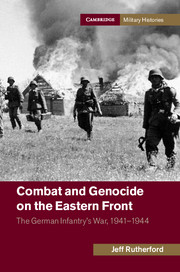Book contents
- Frontmatter
- Table of contents
- List of illustrations
- List of figures
- List of maps
- List of tables
- Acknowledgments
- Introduction
- 1 The Wehrmacht and German society
- 2 Preparations for war
- 3 “Attack with a ruthless offensive spirit and … a firestorm of destruction”
- 4 “Will the continuation of this attackbe worth it?”
- 5 “It is only a question of where, not if, civilians will starve”
- 6 The failure of Operation Barbarossa
- 7 The Soviet winter offensive, 1942
- 8 “The population … shouted out to the interpreter that one would rather be shot instead of being left to starve”
- 9 “From one mess to another”
- 10 “We need to fight to the end, so oder so”
- 11 A more rational occupation?
- 12 “As miserable representatives of themiserable twentieth century, we burnedall of the villages”
- Conclusion
- Bibliography
- Index
- References
6 - The failure of Operation Barbarossa
The fusion of ideology and military culture
Published online by Cambridge University Press: 05 July 2014
- Frontmatter
- Table of contents
- List of illustrations
- List of figures
- List of maps
- List of tables
- Acknowledgments
- Introduction
- 1 The Wehrmacht and German society
- 2 Preparations for war
- 3 “Attack with a ruthless offensive spirit and … a firestorm of destruction”
- 4 “Will the continuation of this attackbe worth it?”
- 5 “It is only a question of where, not if, civilians will starve”
- 6 The failure of Operation Barbarossa
- 7 The Soviet winter offensive, 1942
- 8 “The population … shouted out to the interpreter that one would rather be shot instead of being left to starve”
- 9 “From one mess to another”
- 10 “We need to fight to the end, so oder so”
- 11 A more rational occupation?
- 12 “As miserable representatives of themiserable twentieth century, we burnedall of the villages”
- Conclusion
- Bibliography
- Index
- References
Summary
On 3 July 1941, Halder famously noted, “it is thus probably no overstatement to say that the campaign against Russia has been won within fourteen days.” A little over five months later, Jodl made reference to Napoleon’s disastrous 1812 retreat following the withdrawal of German forces involved in the Tichvin operation. What caused this dramatic reversal of the Wehrmacht’s initial success, specifically with regard to the 121st, 123rd, and 126th IDs? Three issues can be identified: a crippling manpower shortage, supply difficulties that increasingly limited the army’s effectiveness, and a myopic focus on battlefield success that completely ignored the plight of civilians until they were driven to resistance. In combination, these problems highlighted the Prusso-German Army’s traditional focus on battlefield operations. This belief in a generally, if not always, ruthless concept of military necessity not only stoked increasing resistance from the Soviet civilian population, but also paradoxically served as the basis for the Wehrmacht’s failure to destroy the Soviet Union in one campaign. The combined effects of these three issues led to an exhausted and dramatically weakened Wehrmacht by the end of 1941, one that could not achieve any of its prewar objectives. Leeb’s complaint about fighting a “poor man’s war” referenced his army group’s situation but it could readily be applied to the Ostheer as a whole.
- Type
- Chapter
- Information
- Combat and Genocide on the Eastern FrontThe German Infantry's War, 1941–1944, pp. 197 - 216Publisher: Cambridge University PressPrint publication year: 2014

